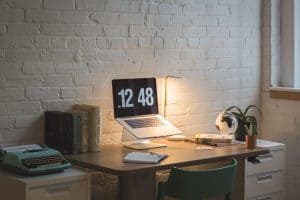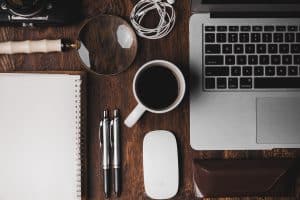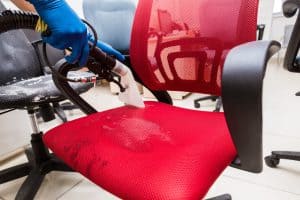One of the greatest factors that affect our productivity is our daily mood. If we’re not in an ideal mindset, how can we be expected to give 100% to our work? While we may not have control over all potential stressors, organizing our desks can help us out a great deal.
Organizing and tidying up your desk can help us manage our thoughts and help us regulate our inhibitions, emotions, and needs accordingly. Especially at the office, where things are usually a little chaotic and stressful, a messy and overcrowded desk can slow things down and bring your stress levels to an uncomfortable level.
In today’s post, we’ll give you some tips on how to organize your desk, as well as how to keep a desk organized. However, before we do that, let’s first look at some of the benefits of keeping an organized desk.
Benefits of Keeping Your Desk Organized
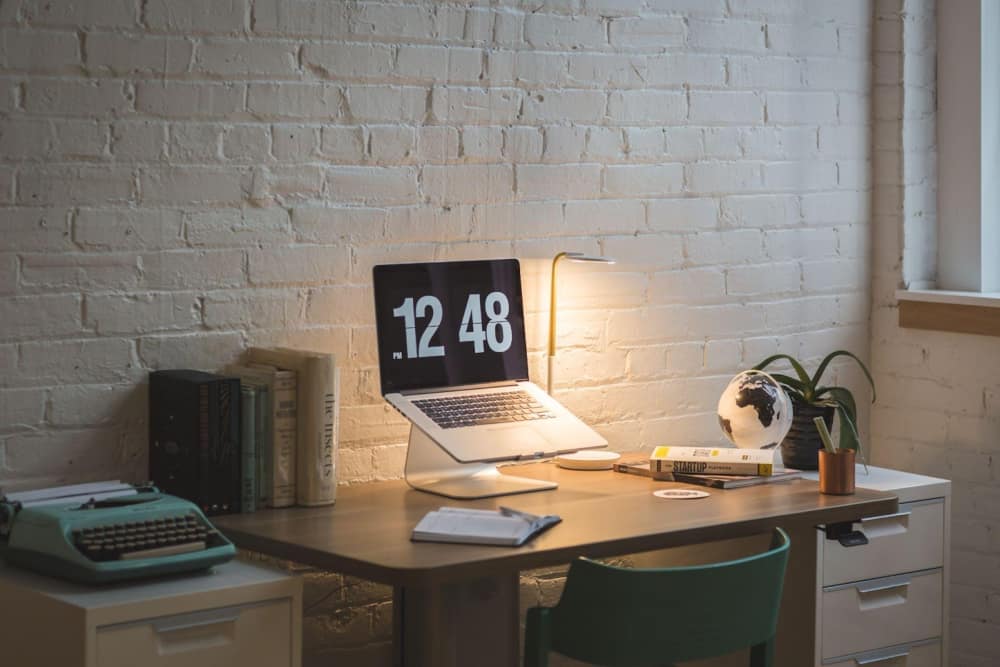
Sometimes, decluttering your desk can help you declutter your mind. This is especially true for your work desk, as studies have proven that clutter is one of the major stressors in the workplace.
Getting Rid of Unnecessary Thoughts
Let’s explain it in the simplest manner. We subconsciously register each object we look at, and our brains produce thoughts and feelings around these objects involuntarily. If your desk has fewer objects, there will be fewer things to look at, and therefore, fewer distracting thoughts are formed in your brain.
Feelings Can Get In The Way
Moreover, we may associate objects with feelings. A great example can be a pile of papers sitting on your desk, waiting for their turn to get your attention. On the surface level, this pile is registered in your brain as simply a pile of papers, but it can also evoke overwhelming feelings such as dread, stress, and maybe even hopelessness. Simply removing them from your eyesight can help you feel much more motivated to tackle them later on.
No More Excuses
Another benefit of staying organized and having an organized desk is that it can allow us to get things done on time without procrastinating. According to research, clutter has a significant effect on procrastination, and an untidy workspace can promote a culture of constant procrastination. This is why organizing things can also help you get to things in a much more timely manner and break the cycle of tasks that are endlessly piling on.
Additionally, keeping a tidy workspace can prevent you from getting into cleaning mode whenever there’s a task that you need to do. Sometimes, when we get overwhelmed by tasks that require brain power, our first instinct is to keep ourselves busy with manual labor or tasks that don’t require thinking. You may find yourself doing the chores you’ve been putting off forever when there’s a detailed report or e-mail that you need to write.
Keeping your desk and the environment around you organized and tidy can help you focus on what’s on your plate rather than what’s around it.
Decision-Making, On-The-Go
Another great benefit of having an organized desk is that it allows us to make decisions faster. A study even claims that the increase of clutter in a workspace causes an increase in indecisiveness.
When the clutter around the office and on your desk increases, making decisions becomes harder. An unorganized desk makes it hard to create a mental map of your tasks and responsibilities, and this lack of focus may lead to indecisiveness.
If your decisions get tied up in your clutter like this, it may be time to take some measures to organize your desk and keep it that way. Let’s look at some of our tips to declutter your desk and stay organized.
Tips on How to Organize Your Desk
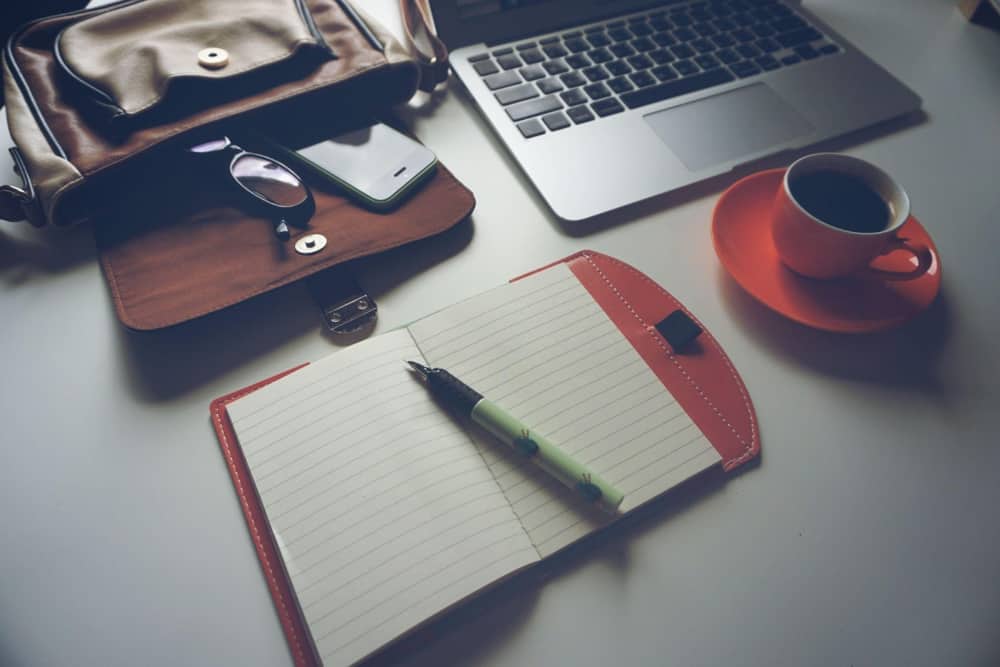
Although the benefits are great, the reality of decluttering or organizing your desk may feel daunting at first, and you may not know where to begin. We have some very simple but effective tips that can help you get things started.
Remove Unnecessary Objects
We tend to keep a lot of stuff on our desks that are not frequently used, but we still enjoy keeping them within reach. It’s human nature to create an accommodating personal environment where everything is available and accessible at all times, but this is more of an instinctual behavior than a rational one.
One of the best ways to decide what needs to go and what needs to stay is to put everything on your desk in a box or a drawer near you. You can do this in the morning when you start working. After clearing out your desk, start working and when you need something that you have removed, put it back on your desk.
By the end of the day, you can clearly see the things you actually need and use and which items are overcrowding your desk. Doing this exercise for a few days or even a week can help you decide which items you need on your desk permanently. If you manage to do this, you’re halfway t to having an organized desk!
Less Personal, More Practical
Less is more when it comes to personal objects in your workspace. Some reminders to your private life can be motivational, but having too many of them can be distracting. Keeping a photo or two of your loved ones is fine, but try not to turn your desk into a shrine of your love. If you’re working from home, however, this may be a bit challenging.
If you’re working from home, you may not have a separate room you can keep as your office. If this is the case, keeping personal stuff out of your workspace can be quite difficult. In addition to keeping your desk tidy and minimalistic, you can try setting your desk in front of a window or a wall to avoid looking at distractions and use noise-canceling headphones.
If you want to learn more about how to organize your desk at home, as well as working from home in the most efficient way possible, you can check out our guide to working from home.
Optimal Placement Is Key
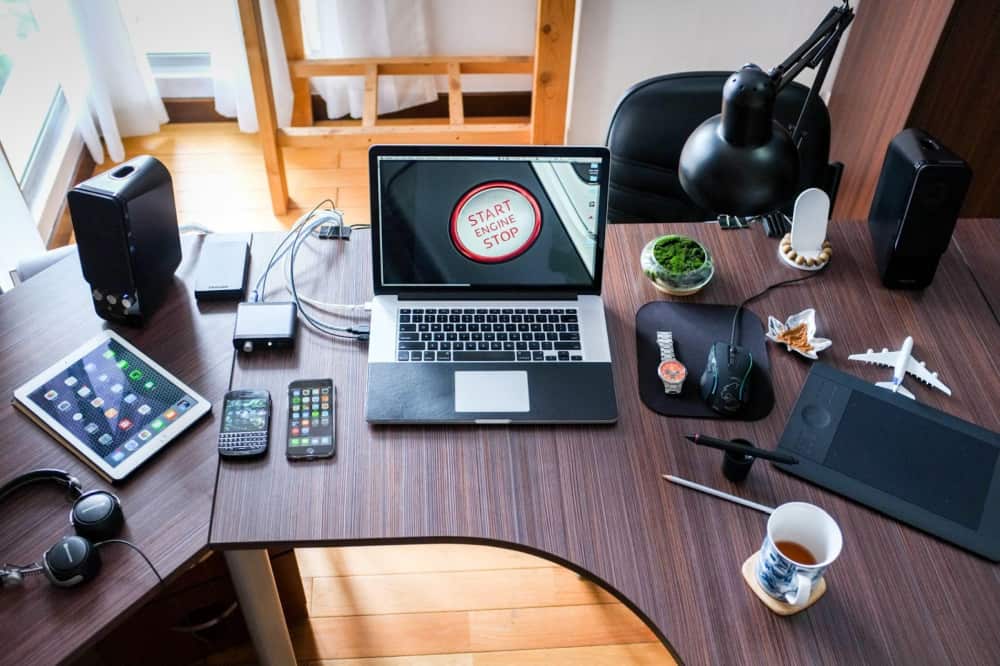
Now that we have removed all the unnecessary clutter from your desk, it’s time to optimize your space!
At this point, we have established that you need free space on your desk, but have you thought about where to place the few items you’ll be keeping on your desk? For example, keeping your computer right in front of you is a good way to prevent distractions.
Additionally, keeping things like a notepad, paper, or pen right under your dominant hand can be an efficient way to keep things practical.
If you don’t need a notepad on your desk, you may want to leave some space that’s big enough for a piece of paper. This way, you’ll always have a place for that file or document your colleagues bring to your desk, instead of having to place it on your keyboard or on other documents you’re working on.
Another great tip is putting items with a similar purpose together on your desk. Items like pencils, pens, and erasers can stay together, as well as staples and paperclips.
If you have a desk lamp, ensure it isn’t in the way. Your lamp shouldn’t take up too much space; therefore, an ideal placement is probably right in the corner of your desk. If you find that the desk is getting enough light, you can even skip the desk lamp! Sure, lamps were a necessity in the past, but computer screens don’t require an external light source. If your lamp is just another distraction disguised as decoration, remove it!
Manage Your Cables
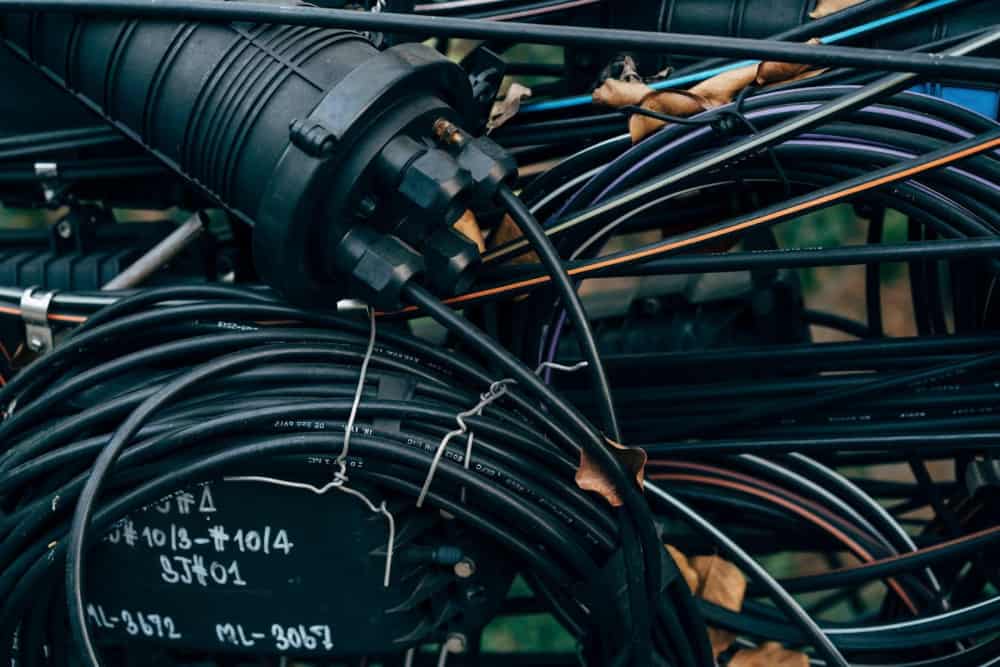
If optimal placement is key when it comes to organizing your desk, cable management is the cherry on top! As a final tip, let’s talk a little bit about managing the cables on your desk.
Nowadays, almost all office desks have a computer and other electronic devices such as printers, phones, or desk lamps. Unfortunately, all of these devices have cords and need to be plugged into a power strip, which is one more thing to clutter your desk. Hidings these cords and cables can be a great way to open up some space and achieve a more minimal environment where you can focus better.
Here are some items that can help you manage your cables easily:
- Zip ties,
- Masking tape,
- Cable baskets, and
- Cable organizer boxes.
In addition to these, there are a variety of other ways you can get your cables out of sight so they can stay out of your mind. You can head over to our post on how to hide cords on a desk to find out all about it.
Conclusion
The benefits of being organized have been proven time and time again. Having a clean desk can help us stay focused and productive and even help us make decisions easier. In short: an organized desk means a clear mind.
In our article today, we tried to explain the best ways to organize your desk and keep it clutter-free. If you want to learn more about organizing and optimizing your office space, head over to our office organization guide and check out over 50 tips to keep your office space as organized and functional as possible.
